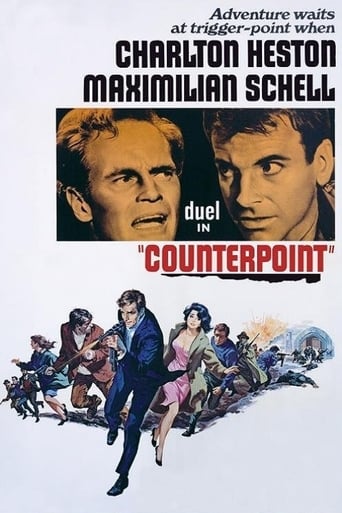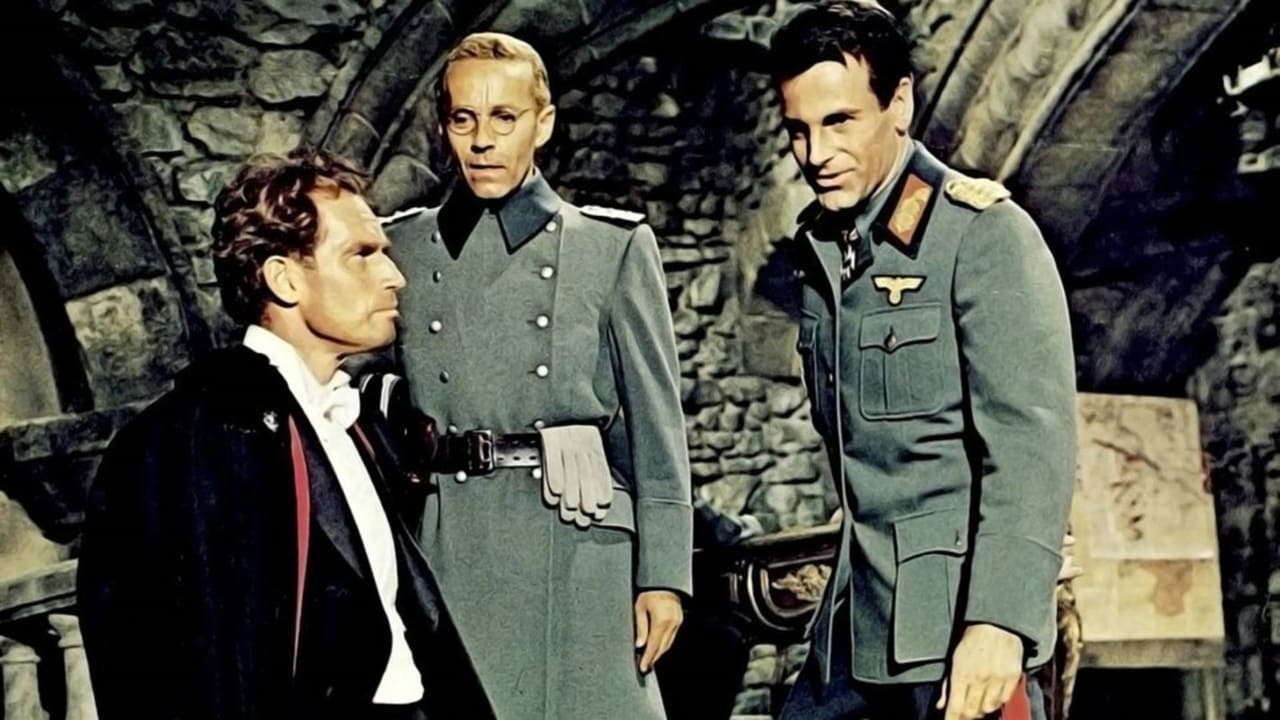MartinHafer
The plot of "Counterpoint" might see ludicrous. However, during WWII, the USO provided entertainment for American troops--both at home and abroad. And, during the Battle of the Bulge, various performers were in Belgium entertaining the troops. In addition, during this surprising German offensive, the Germans frequently murdered their prisoners. All this being taken into account, "Counterpoint" doesn't see so far-fetched.The film begins during an orchestral performance for US Army troops during a break in the war. However, in the midst of this, the Germans attack and the orchestra is soon taken prisoner. The German general in charge (Maximilliam Schell) presents himself as a decent, professional and cultured man. His second in command, the Colonel (Anton Diffring) is essentially a Nazi monster...a man who enjoys murdering prisoners. During much of the film, there is tension between the two, though ultimately the General agrees that AFTER the orchestra performs for him, the Colonel can do what he wants with them. The orchestra leader (Charlton Heston) knows what's in store for them and is trying to find some desperate solution other than to all walk willingly in front of a firing squad! What's next?This is a very unusual war film...extremely unusual. It deserves to be seen just for that reason. However, it is NOT a great films...just a very good one. Much of it is because the film often seems very talky. There is, ultimately, lots of action at the end...but precious little before that. So much so that I am sure the film would bore some viewers.
broomy22313
I saw "Counterpoint" back in 1968 at a local cinema in the Midwest, and I liked it so much I went back the next night and watched it again. I was especially captivated by the acting, the offbeat plot, and the wonderful music. I've not seen it again in forty years . . . until last night, when I was finally able to watch it on DVD. The film is superb. It portrays a psychological tug-of-war between brilliant classical conductor Heston and the great Maximilian Schell, playing another of his patented Nazis who has other dimensions to him besides just being a brutal Nazi. It's during the Battle of the Bulge, and Schell is conflicted in that he loves music while at the same time he must obey orders and practice the routine cruelties of war. His love of music demands that maestro Heston (whom through a quirk of fate he's captured, along with an entire USO orchestra, behind enemy lines) play for him, wanting "something Wagnerian perhaps..." To which the stubborn Heston counters, "categorically, no Wagner." It's mostly about an egocentric, pampered and pompous musician who refuses to play because he realizes that once he does, he and his entire orchestra will be shot (along with two US soldiers who have been trapped in the same net) and a military authoritarian who craves a private, full-orchestra performance just to indulge his sense of art. In reality, both men are uncompromising martinets who demand perfection and absolute obedience to their will. But, as has been pointed out, things are made even more interesting in that there's (a) a traitor in the orchestra; (b) a relationship between Heston and a married female cellist; and (c) an SS officer (perennial Nazi Anton Diffring) who wants to wipe them all out. The plot is similar to the Vanessa Redgrave film "Playing for Time," but with fascinating twists - such as here it is NOT playing that enables Heston and his people to buy time. The music is extraordinary, the setting (an old bombed-out castle) intriguing, the atmosphere foreboding, and the acting - especially the interplay between Heston and Schell - a treat. The "counterpoint" (you've probably by now figured out the pun in the title) between him and Schell is in some ways reminiscent of the relationship Heston had with Olivier in "Khartoum," only a bit nastier and missing the religious overtones. Leslie Nielsen and Kathryn Hays are also interesting and quite convincing as members of the star-crossed triangle. The scenes are all very well written; and the music alone is worth the film. As with my first viewing forty years ago, I've watched it now twice in the past 24 hours, and I'm adding it to my list of Heston's and Schell's best, most essential roles. Odd that Universal never put it out on either VHS or DVD, and that even some of Heston's most ardent fans don't know of its existence. I'm an unabashed Heston AND Maximilian Schell fan. And if you like Schell, you won't be disappointed, since, as one of the other reviewers mentions, the film captures perfectly his charm, private enigma, and charismatic sex appeal. He's one of those delightfully complex Nazis you hate to love; yes, he's a cynical and brutal soldier in service to Hitler and the evil Reich, but his performance makes it impossible not to feel a bit of sympathy for him. His finer instincts also make him a philosopher and music lover, and one gets the feeling that, were it not for the arbitrary lot time and place has dealt him, he would have been someone very similar to Heston - an egoistic, authoritarian professor of music at Berlin University perhaps? But he's been given his orders - kill all prisoners - and he must play the part of an obedient general. Or will he ?? Here one must see the film to its finish, which is not exactly unsatisfying, emotionally speaking. While the plot is definitely offbeat, that's precisely the beauty of it. A riveting film, to say the least. I bought it from ioffer.com for $9.99. The quality of the transfer is middling (the sound is marginal, and the color is so washed out at times I thought I was watching a black-and-white film!); but it's almost impossible to find, so I can't really quibble. This is one little gem I'd love to see restored onto DVD with full surround stereo sound. COME ON, UNIVERSAL, GET WITH IT! An absolute MUST for Heston and Schell admirers - not to mention lovers of classical music.
hallbrass1
Only palatable for true Charlton Heston fans; his attempts at conducting the orchestra are painful to watch. Leslie Nielson is in his serious actor mode, being not so much wooden as cardboard. Maximillian Schell could have phoned in his performance, as it appears he sometimes did.A quaint story concerning this movie states that neither Heston nor Schell was particularly concerned with the project and the choice of final roles; rumor has it that the final decision was made by the toss of a coin as to which would be the conductor and which would be the Nazi. Viewing these performances one can see traits of both in each character.Spoiler Alert! A very picky error concerning the final scenes: the orchestra is heard playing Schubert's Unfinished Symphony and Brahms' First Symphony throughout the movie and before they escape the castle. As they are running out of the shelter of a trench during a bombing raid and into their bus, you can clearly see a tuba player dropping his instrument as he escapes; neither the Schubert nor Brahms pieces are scored for tuba.
Robert W. Anderson
It's now March 15,2006 and I'm adding this remark to my review because of some emails I got asking me to make it known if I find a way to obtain a copy of this film. I have found someone selling this film. I haven't bought one yet, but I plan to. I notice that he says the copy is fair to good. So don't expect wide screen and surrond. But the prices seem resonable, and he even has another one I'm looking for; W.W. and the DIxie Dance Kings. Here is the web address: www.ioffer.com/shops/cinema70. Take your time and make sure you know what your getting. Good Luck This is my second comment on this film. My first comments were brief and some time ago. Since them I notice some quite derisive comments have been left and I wanted to leave a current opinion. The most common negative statement is absurd. Certainly, the story line is fictional, and not that likely to happen. But come on! The fact of the matter is. A symphony orchestra is caught behind the lines of a German advance. And the egos of the two main characters ( the conductor and the German commander) stage their own personal battle. The German commander want a personal performance, the conductor knows they will be killed if he complies. He stalls trying to buy time, and thus save as many lives as possible. This was well acted, and I feel well written. I found myself caring what happened to these people. I wish it was available on DVD.


 AD
AD




